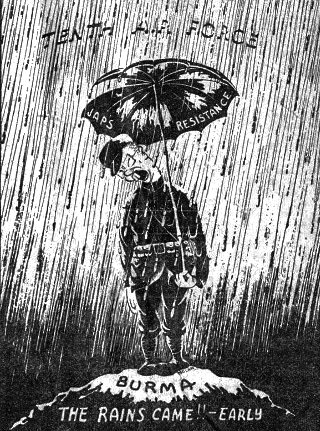
VOL. I NO. 19 DELHI, THURSDAY JANUARY 21, 1943.
HO HUM, MORE BOMBINGS
|
JAP RAILROADS AND STORAGE DUMPS GET BLASTED AGAIN The Tenth Air Force gave the Japs no respite in Burma this week. Communications and storage facilities were singled out as the primary targets. Heavy bombers attacked an escorted enemy convoy far south of Rangoon on Jan. 15. Hits were made on a cargo vessel of 7,000 tons. Debris was scattered over the sea, the crew was seen to abandon ship and the vessel was reported to be in a sinking condition when our planes left. Another vessel of 5,000 tons was believed damaged as the result of near misses. One the same day, fighters attacked enemy targets in northwestern Burma. Poor visibility handicapped observation of results, but an enemy headquarters north of Maingkwan and a footbridge at Taipha Ga were reported to have been bombed and strafed. The next day heavy bombers resumed their search for enemy shipping in the area south of Rangoon. An attack was made on a vessel of 150-foot length but no hits were reported. A few hours later, medium bombers attacked the railroad yards at Maymyo, scoring direct hits on rail junctions and engine shops. A concentration of rolling stock at Monywa was the target of a second formation of mediums. Many hits were reported. On January 17, medium bombers again blasted rolling stock at Maymyo. Many additional freight cars were destroyed and damaged, and a section of the main line was cratered. The China Air Task Force busied itself in action against enemy installations in Northern Burma and Western Yunnan. Bhamo, advanced enemy storage base, was made practically untenable. B-25s and P-40s in fighter-bomber missions and sporadic strafing destroyed warehouses, gasoline storage dumps, munitions and miscellaneous installations. Barges, tugs and other shipping in the Irrawaddy River, adjacent to the concentration point, were destroyed, set afire or badly damaged. At Chefang, Mangshih, and other points along the Burma Road, gasoline dumps and enemy transportation were strafed with undetermined damage. On Jan. 16, a large force of enemy aircraft attempted an attack on an air base in Western Yunnan. Outnumbered more than three-to-one, P-40s intercepted the attacking planes and took the offensive, scoring seven confirmed victories over Zeros with four other fighters probably destroyed. One enemy bomber was also believed destroyed. From the entire week's operations, only one of our planes was reported missing. |
|
Award Given For Heroism Under Fire Lt. General Joseph W. Stilwell, CBI Theater Commander, last week received the Distinguished Service Cross from the War Department for heroism during the Burma campaign. Uncle Joe, who spent most of his time running all over the forward areas like a herd of sheep (to the despair of his staff), was often endangered not only by aerial bombardment, but Jap artillery fire and once by machine guns. While talking one night with a Chinese captain in the front lines, a Jap machine gun only a few hundred yards away cut loose with a blast that wounded the Chinese in the face. Stilwell was about three feet from injury and possibly death upon that occasion. The citation follows: "For extraordinary heroism and conspicuous bravery in action while in command of the Chinese forces in Burma during the spring of 1942. "His presence and personal example in an exposed position in the front lines of a Chinese division on April 23, 1942, inspired the unit to a renewed effort which resulted in the capture of Taunggyi. While at this position, General Stilwell was exposed to concentrated rifle, machine gun and mortar fire which inflicted heavy casualties on the Chinese troops in the immediate vicinity. "On April 28, while visiting the entire front of two Chinese divisions, he spent considerable time with one of them and, while on the ground, directed the readjustment of the forces. During the entire campaign he personally directed operations in positions which were subjected to continuous enemy aerial strafing and frequent air bombardment, with utter disregard for his own personal safety. "His outstanding example of courage and leadership in direct contact with the enemy prolonged, at a critical time and place, the resistance of the forces of the United Nations against a better armed and determined enemy, who still maintained the powerful impetus of initial assault against the Allied forces." |
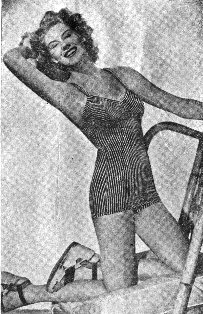 One of the latest arrivals on the Hollywood scene is blonde Marie McDonald, who sang her way into the movies with
big name bands. She's married - just this week - to Victor Orsatti, actor's agent, who is now a Lockheed test pilot.
One of the latest arrivals on the Hollywood scene is blonde Marie McDonald, who sang her way into the movies with
big name bands. She's married - just this week - to Victor Orsatti, actor's agent, who is now a Lockheed test pilot.
|
By BROOKS ATKINSON New York Times
CHUNGKING - When he returned from a routine appointment, General Stilwell was surprised
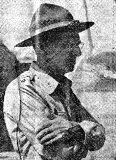
|
"Stand about there, sir, if you please," said Colonel W. E. Bergin, who usually is not formal.
"What is this, an execution?" Stilwell muttered, taking a severe military position in front of his men.
What it turned out to be was the award of the Distinguished Service Cross, a welcome surprise to all his men but not a welcome surprise to "Uncle Joe," although he received it strictly in the line of duty.
Standing at attention, Colonel Bergin read the citation with volume and enthusiasm. When he finished, Lieut. Colonel Joseph W. Stilwell, Jr., pinned the medal on his father's winter field jacket.
"Who thought up all this bunk?" the General whispered to his son.
"Never mind; never mind; never mind," replied young Joe, while he was making sure he had pinned on the medal.
In the Stilwell house, after the ceremony, Uncle Joe said: "I'm not so sure about this business of decorating staff men when there are so many men in the front-line fighting."
"No one begrudges you this decoration," a newspaperman replied.
The General said, "Yes, I know, but I was a lieutenant once, and I used to wonder why the desk men got so much glory."
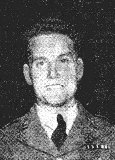
|
Stayed At His Post
One of the Theater's leading gunners, T/Sgt. Adam R. Williams, who has two confirmed Jap planes and one probable enemy aircraft to his credit, is now recovering from wounds received in a raid on Burma and hopes to be back in the "skeet shoot" real soon.
Williams, 23, from Morgantown, N.C., has served for more than three years as an aerial gunner and engineer. His first action against the Japs was as a gunner in one of the bombers that raided Tokyo last April 18. For this service, he received the Army, Navy, Air Force, Class 1, Grade A Medal by the Chinese Government, and the American Distinguished Flying Cross.
After some duty in India, Adam went back to China last summer and resumed his accurate shooting. In October, General Chennault decorated him with the Silver Star for his good aim in the July 3 raid on Hankow.
During the Burma raid in which he was wounded - in each leg and his right arm - Williams stuck to his post until the plane was well out of the danger area, and didn't even accept first aid until he was certain that all was well.
COL. SCOTT GOING HOME
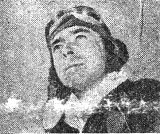
|
Handsome, romantic Robert L. Scott, fighter-group leader for General Chennault, and once known as the "one-man air force," is going home.
The colonel is the leading ace of this Theater with 11 confirmed victories in the air. He has been decorated with one DFC, two Silver Stars, two Air Medals and a recommendation for another DFC now rests in Chungking.
Scott came to India in April and started flying transports under General Haynes. He was in command of our air base in Assam which was composed of a few transports and one P-40. A peripatetic romanticist, Scott could never stay at his base. Day after day he was up in his P-40 and cruising alone over Burma strafing and dropping light bombs strapped under the wings.
Later he flew with the AVG and after that took command of the fighters under the China Air Task Force. He is returning to the United States where he is scheduled to command a tactical air training school.
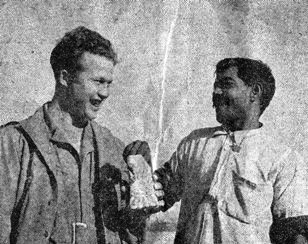 Beech-nut for beetle-nut. Pvt. A. M. Lennon offers one of the camp helpers a sample of a famous old American brand
of chewing tobacco. This fellow found it so good that he wanted some more. Lennon didn't say how he liked beetle-nut.
Beech-nut for beetle-nut. Pvt. A. M. Lennon offers one of the camp helpers a sample of a famous old American brand
of chewing tobacco. This fellow found it so good that he wanted some more. Lennon didn't say how he liked beetle-nut.
|
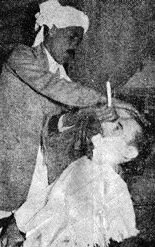 1st Sgt. Marvin T. Hunn gets a shave from Saif Ali, camp barber. Here, the barber comes to you instead of going to him.
1st Sgt. Marvin T. Hunn gets a shave from Saif Ali, camp barber. Here, the barber comes to you instead of going to him.
|
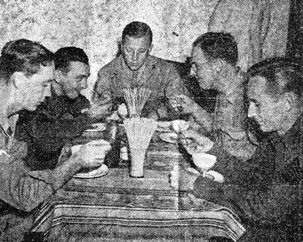 They're a long way from home, but these fellows still enjoy their ice cream. Left to right are: Pfc. D. C. Lemp, Sgt.
V. David, Sgt. C. R. Kinker, Sgt. A. M. Vria and S/Sgt. L. L. Derrington. This takes the place of a soda fountain.
They're a long way from home, but these fellows still enjoy their ice cream. Left to right are: Pfc. D. C. Lemp, Sgt.
V. David, Sgt. C. R. Kinker, Sgt. A. M. Vria and S/Sgt. L. L. Derrington. This takes the place of a soda fountain.
|
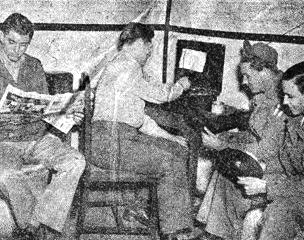 Recordings are a popular recreation in the day room. Pfc. L. Gafford reads an old comic section as Sgt. J. M. Boyd
puts on his favorite platter. Pvt. C. W. Alexander and Pfc. H. Lane make their selections.
Recordings are a popular recreation in the day room. Pfc. L. Gafford reads an old comic section as Sgt. J. M. Boyd
puts on his favorite platter. Pvt. C. W. Alexander and Pfc. H. Lane make their selections.
|
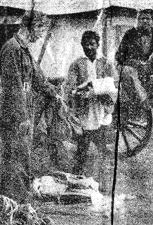 Pvt. F. B. Masters trusts his prized fatigues to the dhobie walla. Bullock carts take the place of stream-lined trucks.
Pvt. F. B. Masters trusts his prized fatigues to the dhobie walla. Bullock carts take the place of stream-lined trucks.
|
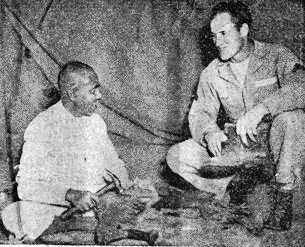 Corp. M. R. Powell has a pair of G.I. shoes repaired by Munni Lal, the camp cobbler. All of the pictures on this
page were taken by Pvt. James G. Doyle, who did a good job of recording camp life with his camera.
Corp. M. R. Powell has a pair of G.I. shoes repaired by Munni Lal, the camp cobbler. All of the pictures on this
page were taken by Pvt. James G. Doyle, who did a good job of recording camp life with his camera.
|
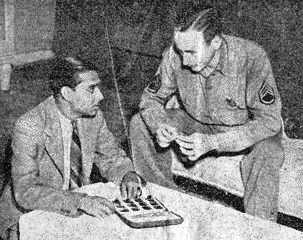 S/Sgt. L. L. Derrington contemplates the purchase of a ring for the lady who became Mrs. Derrington the day
before the Sergeant left the States. Best-selling item for jewel salesmen among our fellows is the star-sapphire.
S/Sgt. L. L. Derrington contemplates the purchase of a ring for the lady who became Mrs. Derrington the day
before the Sergeant left the States. Best-selling item for jewel salesmen among our fellows is the star-sapphire.
|
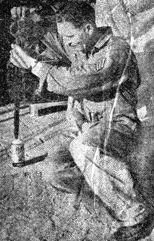 No can openers came in the first cases of rationed beer, but that didn't prevent Sgt. A. J. Bernherdt from enjoying
his.
No can openers came in the first cases of rationed beer, but that didn't prevent Sgt. A. J. Bernherdt from enjoying
his.
|
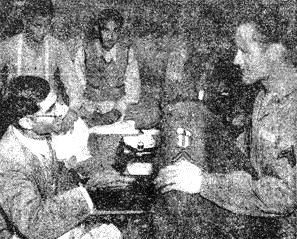 Uanand, the camp tailor, has just finished putting the C.B.I. insignia on Corp. M. R. Powell's blouse. You don't
have to hunt for the barber, tailor, cobbler, dhobie, etc., they're right on the grounds of the camp.
Uanand, the camp tailor, has just finished putting the C.B.I. insignia on Corp. M. R. Powell's blouse. You don't
have to hunt for the barber, tailor, cobbler, dhobie, etc., they're right on the grounds of the camp.
|
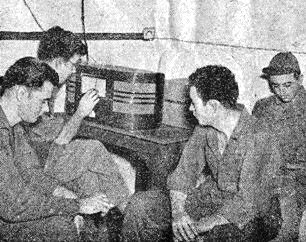 "I wonder if we can get an American program," says Sgt. J. Salechuk as he tunes the radio. In the foreground (left
to right) are Pfc. Roy Cherry, Pvt. C. Hyden, Jr., and Pvt. T. L. Gathright, who is absorbed in a book.
"I wonder if we can get an American program," says Sgt. J. Salechuk as he tunes the radio. In the foreground (left
to right) are Pfc. Roy Cherry, Pvt. C. Hyden, Jr., and Pvt. T. L. Gathright, who is absorbed in a book.
|
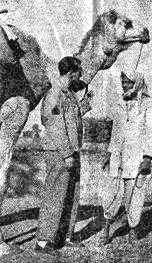 T/5 L. Steinberg finds out something about the life of a camel. He didn't find out why camels always look bored.
T/5 L. Steinberg finds out something about the life of a camel. He didn't find out why camels always look bored.
|
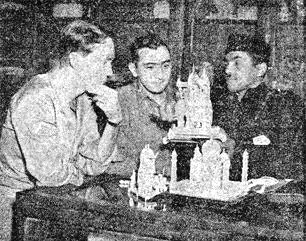 Sgt. V. David and Pfc. D. C. Lemp are told that they are friends and not customers as an Indian merchant tries to
build up their interest in purchasing some carved ivory. Yes, these fellows made some purchases.
Sgt. V. David and Pfc. D. C. Lemp are told that they are friends and not customers as an Indian merchant tries to
build up their interest in purchasing some carved ivory. Yes, these fellows made some purchases.
|
LATRINE EXPLOSION
During war-time your life isn't safe even in the latrine!
With Americans, the growler has always been a place in which to sit with an air of quiet dignity, smoke a cigarette, read the morning paper or just meditate while attending to the biological amenities.
Lt. David Hunter, a cryptographic officer up in Assam, however, learned a while back that all is not beer and skittles when he made his customary morning call. He calmly lit a cigarette and tossed the lighted match down the hole in the thatched officers' meditation booth.
The resultant explosion not only singed his eyebrows but gave him a quick impression of a latrine version of Dante's Inferno.
No - the boys don't have acidosis up there. British sanitary engineers had mixed a bit of gasoline with the oil they normally pour in as a hygienic measure.
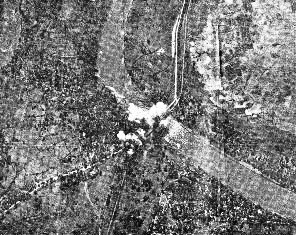 Myitgne bridge, near Mandalay, is the target for well-placed bombs dropped by the India Air Task Force. Observers
reported a central span resting on the Irrawaddy River bottom when the planes departed. This bridge, carrying all
vehicular as well as rail traffic across the river, is vital to Japanese movements in central Burma, and effectively
cuts north and south communications. The damage was done by bombers under Maj. Earl Tash's command.
Myitgne bridge, near Mandalay, is the target for well-placed bombs dropped by the India Air Task Force. Observers
reported a central span resting on the Irrawaddy River bottom when the planes departed. This bridge, carrying all
vehicular as well as rail traffic across the river, is vital to Japanese movements in central Burma, and effectively
cuts north and south communications. The damage was done by bombers under Maj. Earl Tash's command.
|
GOOD HUMOR-WALLA
TOTTERS ON UNICYCLE
By CORP. KARL PETERSON
Readers of the Roundup have heard plenty about the fancy doings of General Chennault's China Air Task Force, which has carried on stoutly where the A.V.G. left off in smiting the Jap wherever found; now we think it's high time someone started beating the drums for an outfit that in the past couple of months has given Tojo's troopers in Burma a steadily increasing buffeting.
This new station clamoring on the C-B-I net would like to lift out from its anonymity as "American bombers based in India," Brigadier General C. V. Haynes' India Air Task Force. And the IATF, by the way, may lay claim to quite as illustrious antecedents as its counterpart in China, for many of the leading dramatis personae in the new unit have previously appeared in such thunderous productions as "Wings Over Macassar Strait" and "Tokio - Target for Today," the latter starring Jimmy Doolittle.
Combat communiqu s come from Delhi, but within the limits of not tipping the Nip to anything he hasn't already conned in the pages of Morning Call we intend to give out with what the heroes do outside office hours, their daily good deeds, foibles, and faux pas, so let the brickbats and bouquets fall where they may.
To open on a cheerful note, let it be proclaimed that no longer are we singing the "T.O. Blues," for word has come over the water that our existence is legal, and with a grant of assorted shoulder hardware and sleeve slashes calculated to gladden all hearts. First men to start peeling this bonanza were "To Be Staff Sergeants" Melvin H. Storey, Charles M. Mow, and Chester E. Janzen, three of the Headquarters' hardest-working desk jockeys, who last week slipped quietly into grade three without even looking up from their respective blotter pads.
Other aspiring Johns, whose careers were yet to make, had to be content with declaring an open season on bucking, and the sight of the week was that of the different officers around the place munching ice cream bars presented them by their enlisted coworkers. The only guy showing any immediate profit, however, was the Good Humor-walla in the street outside, who nearly fell off his unicycle in the sudden rush of business.
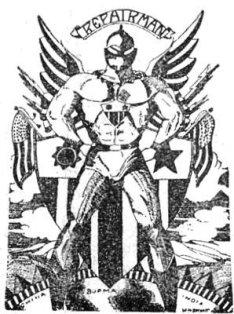
He dedicates it to all repairmen in the Theater. |
|
If you guys in India miss those American radio programs, you can tune in some recorded versions on the All-India Radio, 85.84 meters and 31.3 meters. On Tuesday, Jan. 26, at 9-45 p.m., there will be a half-hour show, "Your Broadway and Mine," starring George M. Cohan, Walter Huston, Victor Moore, Diana Barrymore and Betty Hutton. On Wednesday, Jan. 27, 10-05 p.m., Dinah Shore will present a half-hour of songs. |
|
PRIVATE GEE EYE 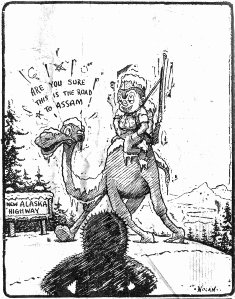
|

|

When soldiers go out and have some fun, They always forget about some other one. That someone's on duty every day, To see that these soldiers are safe at play. They call him names that we can't print, But they should sit down and try to think. These men are detailed for this tough job, So why go around and call him a snob? When a guy's in trouble, and things look bad, They call on this fellow, and then he's not bad. At the end they will say, "this fellow took up for me." And the fellow that did it was your American M.P. One thing to remember fellows when you're down and out, There's a fellow that will help you if he hears you shout. He will stand beside you and fight like hell. So do the right thing, and treat him well. Just remember fellows on your holiday, One of your buddies can't go out and play. You call him an outcast, and other names, But he's your buddy, just the same. We envy no one, try never to do harm. We're here to keep you safe, in every form. So if you see us on duty, please don't get mad. Remember we're here for you, and that M.P.'s aren't bad. - S/Sgt. GODFREY J. DARBY |
|
When reception is poor and the signal stinks And you think of bed and your forty winks And the PE coughs and pulls high jinks That aint war, that's hell. When your grease is cold and your rear guns fails With a Zero riding each of your tails And you curse your luck and bite your nails That aint war, that's hell. When you've hiked all night and your feet are sore And your throat's all parched and your clothes are tore And the C.O. says just ten miles more That aint war, that's hell. When you're climbing a hill and the motor's hot And the left read blows like a pistol shot You hope its a back fire but you know it's not That aint war, that's hell. When the whistle blows for the day's mail call And you're sweating a letter from your butter-ball And Jones gets a card and they say that's all That aint war, that's hell. When the chow bell rings and you hope for ham But the guy who cooks don't give a damn So all you get is a slab of Spam That aint war, that's hell. But when the war's been won by your nation And you dream of home with anticipation But the order says Army of Occupation Brother that will be hell. - Sgt. CARL BROOKMAN |
Small Change, Or Outwitting Those Beggars
"No Mamma, No Pappa, No Shoes - give me two annas, Sahib," the traditional chant of the professional Indian beggar has now become a hollow mockery.
He's still got no Mamma, no Pappa and no shoes during working hours, but nobody else has got two annas anymore.
By this we don't mean that the U.S. Forces in India have become insolvent and that per diem is no more. Per diem is still with us, though limited (curses), and the finance office still has lettuce in the cash register.
All this comes about because, for various reasons, mostly unexplained, there is a shortage of coin
|
EXPANSIVE GESTURES
When a starry-eyed beggar approaches you, discusses lack of paternity, maternity and shows you the Achilles tendon well exposed, your cue is to reply, "no annas, no pice, no baksheesh suffice. It's gotta be cheap at most any price."
He or she will naturally persist with the dogged determination of an American insurance jockey. naturally you will demur with expansive manual gestures demonstrating your empty-handed estate. You will shrug sadly, cast your eyes in the general direction of Mecca (if the guy putting on the bite is a Mohammedan), call upon Krishna to witness your poverty if he be a Hindu and you all know what to say if the jerk is a Christian.
He will look a you reproachfully but will not retreat. That, naturally, is when you pull out a Rupee note, wave it gently in the general direction of the person who is giving you the pinch and adroitly pull it away as he reaches. After repeating this performance a few times you say:
"I'll give you annas 2, but kick through with annas 14 change on this note, Bud!
IN A QUANDRY
This immediately puts the beggar on the defensive, in fact it puts him in a quandry, and a quandry is a very unpleasant place for a beggar or anybody else to be. It's almost like running out of Scotch in the middle of your New Year's Eve party. A shocker, actually!
The beggar, of course, wants the annas 2, but to get it he must pony up annas 14. He probably has annas 14 plus $2000 worth of American Tel and Tel in the vault under his piece of sidewalk sleeping accommodation, but to admit it would invalidate his original premise of poverty.
If you all follow these instructions you will find that the beggars will refuse to give change for a long time, but he will finally get tired of just clipping coupons off his securities and will start giving annas 14 change for every Rupee offered. This, naturally, will bring all the change out of hoarding, remove a thorn from the side of the Government of India, and relieve a delicate economic situation.
It's possible that we might all get decorated!
The C.B.I. Roundup is a weekly newspaper published by and for the men of the United States Forces in China, Burma, and India, from news and pictures supplied by staff members, soldier correspondents, Office of War Information and other sources. The Roundup is published Thursday of each week and is printed by The Statesman in New Delhi, India. Editorial matter should be sent directly to Major Fred Eldridge, Rear Echelon, Hq., U.S.A.F., C.B.I., New Delhi, and should arrive not later than Monday in order to be included in that week's issue. Pictures must arrive by Sunday and must be negatives or enlargements. Stories should contain full name and organization of sender.

JANUARY 21, 1943
Original issue of C.B.I. Roundup shared by Ruth Canney, widow of CBI veteran John Canney.
Copyright © 2006 Carl Warren Weidenburner
TOP OF PAGE PRINT THIS PAGE ABOUT THIS PAGE SEND COMMENTS
PREVIOUS ISSUE CLOSE THIS WINDOW NEXT ISSUE
|
|
